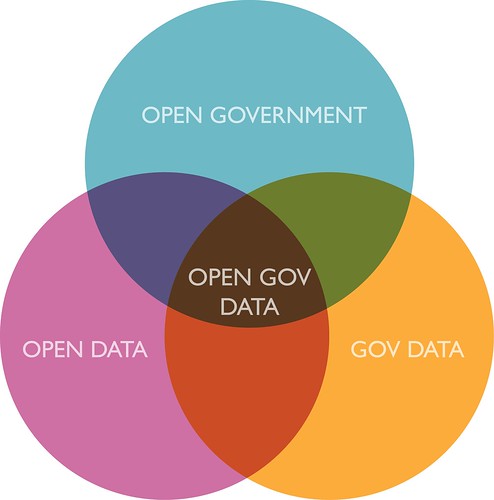
Open government data - simple venn diagram - by justgrimes on flickr, available on CC licence. Click image to see justgrimes's photostream
I was at the Open Data Cities Conference on Friday. Held here in Brighton, it focused on how releasing publicly held data can transform cities through innovation and by revealing new understandings of the places we live.
A stellar list of speakers – including Tom Steinberg of mySociety, Laura James from Open Knowledge Foundation and Bill Thompson of the BBC – entertained and enlightened us throughout a thought-provoking day.
I’ve picked five quotes from the conference that really struck me, but to start with here are my five observations from the conference :-
- Open data isn’t a discipline, it’s a movement. Mostly, still, data isn’t open, so conferences like Friday’s are about how that should happen and why it’s a good thing, not about what practical steps we can make to derive value from that data as a society. This isn’t a criticism, but it does point towards the future. We’re beginning to deal with it becoming a discipline, but we’re a long way off that happening.
- Opening data is expensive and hard. This was a point made by Tom Steinberg, rather well I think. We might know implicitly that some data should be open, but we shouldn’t assume that it’s easy to do – especially if that data is locked away in computer systems from many moons ago when no one ever envisaged today’s preoccupations. Having a sense of this – and making contributions towards this process (by helping as people like Chris Taggart and Paul Clarke among others helped Emer Coleman, another of the speakers) is absolutely essential.
- Data at the moment is about developers and it needs to be about communities. If cities are to enjoy truly transformational benefits from teh opening up of data they need to find ways to get data into the hands of ordinary people, so they can interogate that data and begin to solve their own problems. As Leigh Dodds pointed out when he made observations about the publication of data (and data hubs) this may be quite difficult but it is a very important issue.
- Not only data needs to be open. Bill Thompson’s talk on the BBC’s attempts to open up its archives underlines that it isn’t just numbers in spreadsheets that deserve our attention. Finding ways to open up other types of information is essential. While I didn’t pick up on any mention of it at the conference, the work being done by Judith Townend and others into Open Justice also deserves our urgent attention.
- We need to tell more stories. I’ll confess that this is almost always what I think about almost everything, but, nonetheless, I did feel that what’s really needed is a concentrated effort to demonstrate how data can be used practically by people now. I missed the lunchtime slot (which I believe did cover some of this ground) but showing off how (for example) you can past a KML URI into Google maps to show where the City Council’s public toilets are may have more value on its own than is sometimes appreciated. (And I’m guessing that a fair number of people remain unaware of just how easy it is to already get at some data.) For example: This took about a minute…
Five quotes (using an old fashioned open-data tool, shorthand):-
“We should be encouraging digital graffiti.” Leigh Dodds, talking about how it is essential that we find ways for people to label (or identify) data for themselves. He also said: “The fundamental part of that is freeing up the identifiers [to open use].”
“If you have a button on your website that says ‘get what I want please’ and you have an eight-out-of-ten chance of getting it then you have become an open-data city.” Tom Steinberg advising city councils to ensure they have a means to spot the really interesting inquiries and respond to them.
“We have to fight for the future that we want, otherwise we will get the future that we deserve.” Drew Hemment, Future Everything, after providing a counter-point to some of the optimism of the data age.
“At some stage we will build glorious palaces but at the moment we are just hammering logs into the swamp.” Bill Thompson, who likened the development of open data cities to the building of Venice.
“It is moving from the tyranny of the expert to the wisdom of the crowd.” Emer Coleman, of the Government Digital Service on the cultural difficulties that public servants encounter in moving to open data.
One last thing: A massive thanks to Greg Hadfield for organising the conference. I know it was a huge effort to take on and I hope he’s getting plenty of rest now!





Join the discussion One Comment